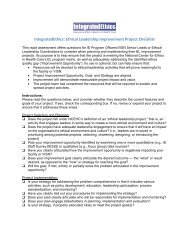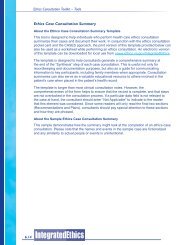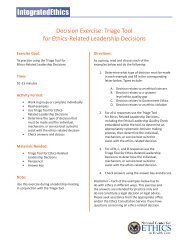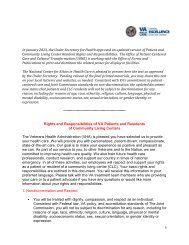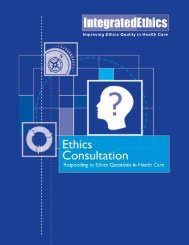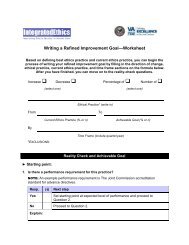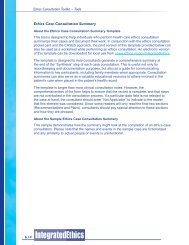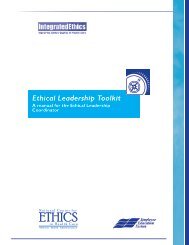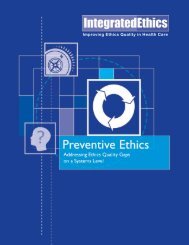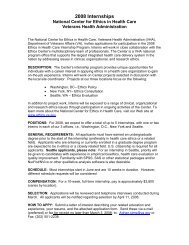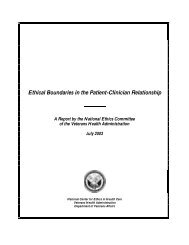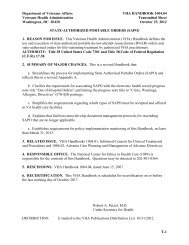Ethical Leadership: Fostering an Ethical Environment & Culture ...
Ethical Leadership: Fostering an Ethical Environment & Culture ...
Ethical Leadership: Fostering an Ethical Environment & Culture ...
Create successful ePaper yourself
Turn your PDF publications into a flip-book with our unique Google optimized e-Paper software.
Part I: Introduction to IntegratedEthicsA healthy ethical environment <strong>an</strong>d culture doesn’t just improve employee morale; it alsohelps to enh<strong>an</strong>ce productivity <strong>an</strong>d improve efficiency.[14–16] Org<strong>an</strong>izations that supportdoing the right thing, doing it well, <strong>an</strong>d doing it for the right reasons tend to outperformother org<strong>an</strong>izations in terms of such measures as customer satisfaction <strong>an</strong>d employeeretention.[17,18] Failure to maintain <strong>an</strong> effective ethics program c<strong>an</strong> seriously jeopardize <strong>an</strong>org<strong>an</strong>ization’s reputation, its bottom line, <strong>an</strong>d even its survival.[19]Ethics is also closely related to quality. A health care provider who fails to meet establishedethical norms <strong>an</strong>d st<strong>an</strong>dards is not delivering high-quality health care. By the same token,failure to meet minimum quality st<strong>an</strong>dards raises ethical concerns. Thus ethics <strong>an</strong>d qualitycare c<strong>an</strong> never truly be separated.The Concept of Ethics QualityWhen most people think of quality in health care, they think of technical quality (e.g.,clinical indicators) <strong>an</strong>d service quality (e.g., patient satisfaction scores). But ethics quality isequally import<strong>an</strong>t.[20] Ethics quality me<strong>an</strong>s that practices throughout <strong>an</strong> org<strong>an</strong>ization areconsistent with widely accepted ethical st<strong>an</strong>dards, norms, or expectations for a health careorg<strong>an</strong>ization <strong>an</strong>d its staff—set out in org<strong>an</strong>izational mission <strong>an</strong>d values statements, codesof ethics, professional guidelines, consensus statements <strong>an</strong>d position papers, <strong>an</strong>d public<strong>an</strong>d institutional policies.For example, let’s say a patient undergoes a surgical procedure. From a technical qualityperspective, the operation was perfectly executed, <strong>an</strong>d from a service quality perspective,the patient was perfectly satisfied with the care he received. So the care was of high quality,right? Well, not necessarily. Imagine that the patient was never really informed—or waseven misinformed—about the procedure he received. This would indicate a problem withethics quality.The idea of ethics quality as a component of health care quality isn’t exactly new.Donabedi<strong>an</strong>, who is widely regarded as the father of quality measurement in health care,defined quality to include both technical <strong>an</strong>d interpersonal components, interpersonalquality being defined as “conformity to legitimate patient expectations <strong>an</strong>d to social <strong>an</strong>dprofessional norms.”[21] Other experts have proposed “ethicality”—the degree to whichclinical practices conform to established ethics st<strong>an</strong>dards—as <strong>an</strong> import<strong>an</strong>t element ofhealth care quality.[22] And it’s been argued that specific perform<strong>an</strong>ce measures for ethicsshould be routinely included in health care quality assessments.[20]Ethics Quality GapsHealth care org<strong>an</strong>izations in this country have signific<strong>an</strong>t “opportunities for improvement”with respect to ethics quality,[23] <strong>an</strong>d VA is no exception. Over the past several years, VA’sNational Center for Ethics in Health Care has been collecting data on the VA health caresystem—through formal <strong>an</strong>d informal surveys, interviews, <strong>an</strong>d focus groups—to underst<strong>an</strong>dwhere there are ethics quality gaps. What have we found?VA employees:• regularly experience ethical concerns• w<strong>an</strong>t more tools <strong>an</strong>d support to address their concerns• perceive that the org<strong>an</strong>ization doesn’t always treat ethics as a priority



